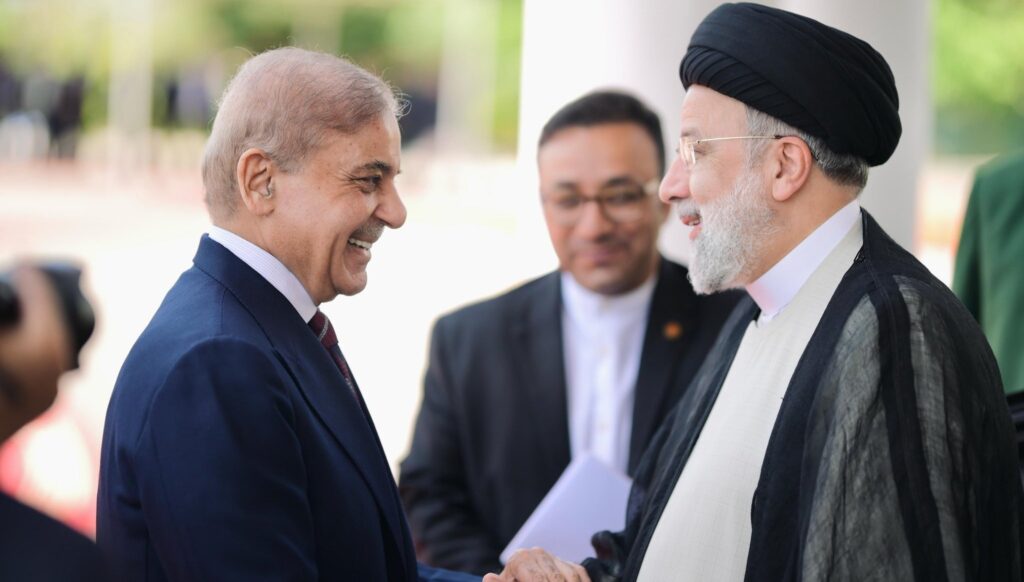As regional tensions between Iran and Israel continue to simmer, Iranian President Ebrahim Raisi embarks on a pivotal three-day visit to Pakistan. The visit, aimed at strengthening ties between the two neighbouring nations, comes on the heels of cross-border skirmishes and missile attacks that have escalated tensions in the Middle East.
Table of Contents

Why is Ebrahim Raisi’s Visit to Pakistan Crucial?
President Raisi’s visit to Pakistan holds significance, especially given the recent flare-ups between Iran and Israel. Israel’s airstrikes on Iran’s Isfahan province were followed by Iran’s retaliatory drone and missile attacks against Israel. These military actions, sparked by an alleged Israeli attack on an Iranian diplomatic mission in Damascus, have raised international concerns.
The Agenda: Building Bridges Beyond Borders
During his visit, President Raisi is scheduled to meet with Pakistan’s top leadership, including Prime Minister Shehbaz Sharif, President Asif Ali Zardari, Senate Chairman Syed Yusuf Raza Gillani, and National Assembly Speaker Sardar Sadiq. The Iranian President will also venture to major cities, Lahore and Karachi, to engage with provincial leadership.
The visit aims to focus on bolstering economic, border, and energy ties between the two nations. Both countries are keen on enhancing cooperation in diverse fields such as trade, connectivity, energy, agriculture, and people-to-people contacts.
The Backdrop: Iran-Pakistan Relations
Iran and Pakistan share a complex history marked by border tensions and mutual accusations of harboring armed groups. However, both nations have shown resilience in maintaining a dialogue despite the challenges.
Earlier in January, border tensions flared when Iran conducted air attacks on alleged bases of the armed group Jaish al-Adl in Pakistan, resulting in civilian casualties. Pakistan responded by launching a missile into Iranian territory and recalling its ambassador from Tehran. Despite these hostilities, the two countries quickly moved to de-escalate tensions and committed to jointly combatting terrorism, particularly along their shared border.
The Economic Dimension: Trade and Energy
Bilateral trade between Iran and Pakistan currently stands at over $2 billion. Both nations have been working towards enhancing this figure, with Iran setting an ambitious target of $10 billion in bilateral trade. A significant portion of this trade is informal, encompassing commodities like liquified petroleum gas (LPG), crude oil, and electricity.
In a symbolic move towards boosting trade ties, Sharif and Raisi inaugurated the first border market at the Mand-Pishin border crossing in May 2023. However, plans for a gas pipeline to export Iranian natural gas to Pakistan have been stalled due to U.S. sanctions against Iran over its nuclear program.
Cultural and Religious Bonds
Beyond economic ties, Iran and Pakistan share deep-rooted cultural and religious connections. Tens of thousands of Shia minority pilgrims from Pakistan visit Iran annually for religious purposes. Despite these strong cultural ties, people-to-people exchanges and formal trade have not flourished as expected.
Pakistan’s Stance on Iran-Israel Tensions
Pakistan, which does not recognize Israel, has been vocal about the need for de-escalation in the Iran-Israel conflict. Following Iran’s strikes on Israel, Pakistan’s Foreign Ministry issued a statement emphasizing the consequences of diplomacy breakdown and the imperative need for international efforts to stabilize the situation.
Conclusion: A Path Towards Peace and Cooperation
President Raisi’s visit to Pakistan comes at a critical juncture, offering an opportunity to recalibrate relations and pave the way for regional stability. As both nations navigate complex geopolitical landscapes, the importance of dialogue, cooperation, and mutual understanding cannot be overstated.
With a shared commitment to combating terrorism, enhancing trade, and deepening cultural ties, Iran and Pakistan stand on the cusp of forging a renewed partnership that could redefine the future of South Asian and Middle Eastern geopolitics. Stayed tuned for more updates.
